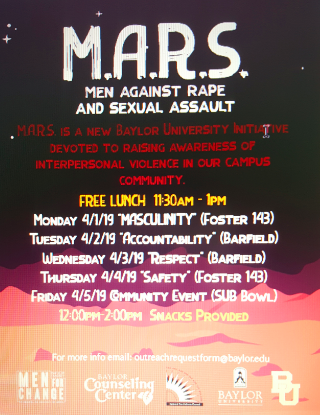
By Matthew Muir | Staff Writer
The first meetings in the week-long Men Against Rape and Sexual Assault lunch series took place Monday and Tuesday afternoons at the Paul L. Foster Campus for Business and Innovation. The series will continue through Friday.
The lunch series runs through Friday and tackles topics including accountability, respect and safety, and each meeting includes free food. The series is part of the nationwide Men Against Rape and Sexual Assault initiative (MARS). MARS seeks to educate men about the role they can play in eliminating sexual assault.
Monday’s meeting was presented by members of Baylor Men for Change and was held in the Foster Campus for Business and Innovation. MFC was created in response to ongoing allegations of sexual assault at Baylor, and the MARS lunch series is MFC’s latest effort to reach out to the Baylor community. Dr. Josh Ritter, the assistant director for spirituality and public life with Baylor Spiritual Life, explained the goal of MFC.
“We basically just wanted there to be a group of men who were there to say ‘this is not okay,’” Ritter said. “Even if [men] don’t agree with what’s going on, they don’t always say something, so a lot of times the male voice is the silent one when it comes to speaking against acts of sexual violence.”
Masculinity was the theme for Monday’s meeting. Speakers devoted much of the meeting to discussing “hyper-masculinity;” the stereotypical masculine image many men feel pushed to live up to. According to the speakers, this hyper-masculine ideal promotes strength, competition and aggression over expressing emotions and is a contributing factor to both sexual assault and the high rate of suicide among men compared to women.
Salvador, Brazil junior Joao Moraes said the choice to discuss “hyper-masculinity” rather than “toxic masculinity” could help reach people who previously may not have been willing to listen.
“I think both [toxic masculinity and hyper-masculinity] are good expressions to use and refer to the same thing, however toxic masculinity does have a seemingly negative connotation towards masculinity in general,” Moraes said. “I hear a lot of people say ‘oh, when you talk about toxic masculinity, you’re saying that masculinity is toxic,’ that’s not true. When we say hyper-masculinity, people get it that you’re talking about a type of masculinity.”
Moraes said he’d encourage other students to attend the remaining meetings, and that the meetings are good way to engage with sensitive topics in a safe setting.
“First of all, this is a very safe space. No one is here to bash on you, to bash on masculinity,” Moraes said. “People are here to accept everyone and to listen to everyone.”
Ritter also said he’d welcome more students at the other meetings throughout the week, but chose to highlight the perks of attending.
“Why not come and learn more about how to prevent sexual assault and sexual violence?” Ritter said. “There’s free food.”
Three more meetings are planned for the week. Wednesday’s meeting is from 11:30 a.m. to 1 p.m. in the Barfield Drawing Room and will focus on respect. Thursday’s meeting will take place in in Foster 143/144 from 11:30 a.m. to 1:00 p.m. and will discuss safety. The last event of the week is a block party-style event in the SUB Bowl on Friday from noon to 2:00 p.m.





